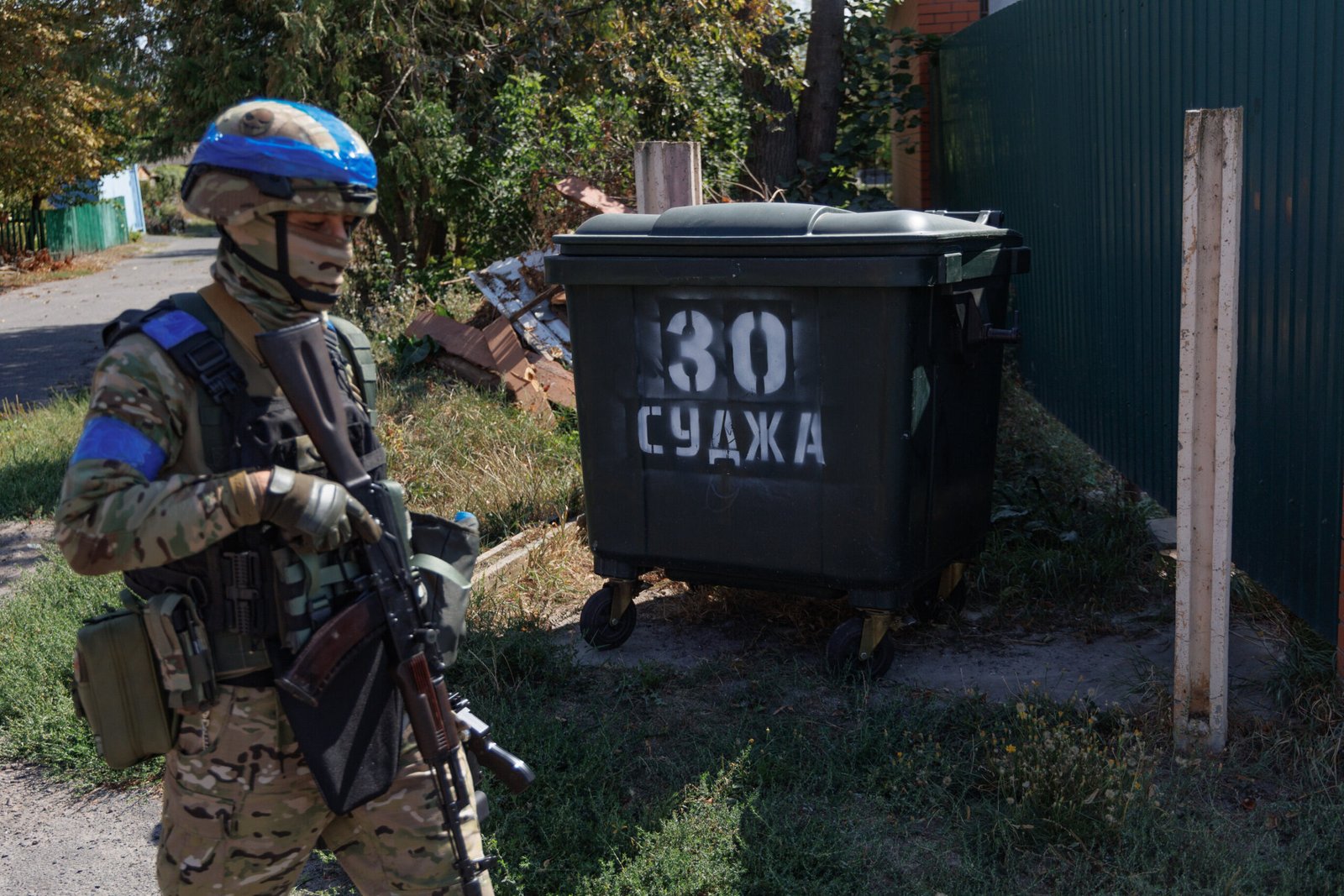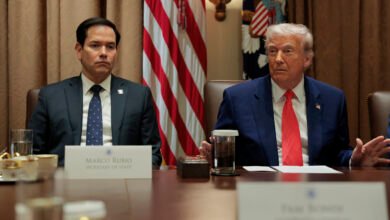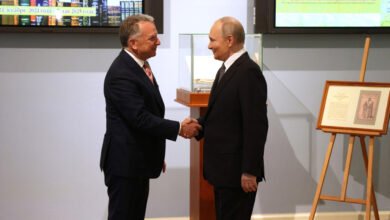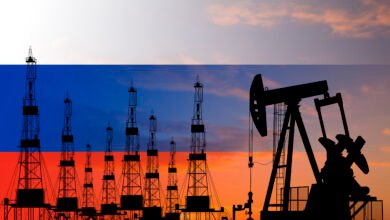The impact of Ukraine’s August 6 offensive operation into Kursk oblast remains an open strategic question following four weeks of increasingly intense and fluid fighting (see EDM, August 14, 15).
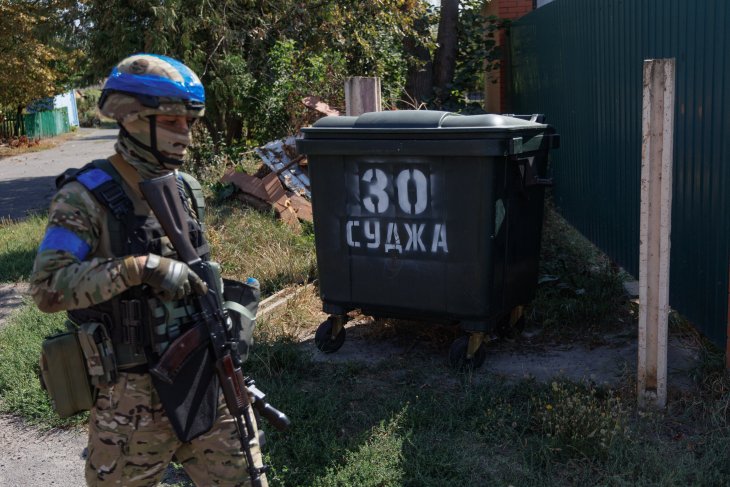
Ukrainian soldier on August 30, 2024 in Sudzha, Kursk Region, Russia. Photo: Oleg Palchyk/Global Images Ukraine via Getty Images
Russian President Vladimir Putin’s first reaction to this incursion was clearly misinformed by intelligence assessments portraying it as just another tactical raid.
A “counter-terrorist operation”
It was only on August 24 that he found time for an extensive briefing with the Chief of the General Staff Army General Valery Gerasimov and his first deputy, Colonel General Sergey Rudskoy (RBC; Kremlin.ru, August 24). The top brass did not have any good news for the commander-in-chief, but he apparently did not demand a decisive counterattack aimed at the complete expulsion of enemy troops from Russian territory. While some “patriotic” Russian bloggers claim that the Kursk battle signifies the transformation of the “special military operation” into a real war, Putin prefers to define Russian defensive battles as a counter-terrorist operation (TopWar.ru, August 29).
Putin’s lack of initiative in countering this incursion demonstrates how he is trying to avoid the perception within Russia that Ukraine is a formidable foe and that Moscow may not be able to win this war.
Diminishing support for Putin’s war policy
On the Kremlin’s instruction, Russian mainstream media has downplayed the significance of the Ukrainian offensive and sought to present the continuing retreats of Russia’s forces and citizens from Kursk villages as a “new normal” (Meduza, August 21). Russian society finds this reassurance comforting but far from convincing, and the hidden angst translates into diminishing support for Putin’s war policy, which even the official polling agencies have not quite been able to camouflage (The Moscow Times, August 30).
Economic consequences of the unfolding calamity are accumulating slowly, and many Russians are relieved that no new sacrifices are required and that rumors about a new mobilization are growing old (The Moscow Times, August 23; Svoboda.org, August 30).
The families of conscripts are anxious about the fate of poorly trained soldiers, and the approaching autumn conscription cycle casts a gloomy shadow (Svoboda.org, August 21; Vedomosti, August 26).
Ridicule and hawkish silence
Putin’s uncharacteristic timidity has granted Ukrainian President Volodymyr Zelenskyy an opportunity to ridicule Russian “red lines” drawn by a “sick old man from the Red Square” (Current Time, August 24). Putin was prone to threatening nuclear escalation for breaching hypothetical “red lines,” leaving their exact location and content conveniently vague (The Insider, June 13).
The Ukrainian occupation of some five percent of the territory of Kursk oblast could have qualified as such a breach but apparently does not, as the official signaling about forthcoming revisions of Russian nuclear doctrine and the lowering of the Kremlin’s threshold for a first strike have stopped (Forbes.ru, June 20). The choir of hawkish pundits led by Russian political scientist Sergei Karaganov has also become silent on the matter of breaking Western unity by delivering a series of nuclear strikes. Dmitri Trenin, a formerly pro-West Russian political scientist turned pro-Kremlin Putin supporter, now merely argues for a firm response to North Atlantic Treaty Organization (NATO) dominance in the Baltic theater (Profile.ru, August 13).
F-16 and nuclear escalation
Another issue that used to be portrayed as a possible trigger for nuclear escalation is the long-awaited arrival of the first squadron of F-16 fighters to Ukraine (Meduza, August 5). Russian commentators speculated at length that the deployment of these planes to airbases in Poland and Romania would make NATO countries legitimate targets for Russian nuclear strikes, but the appearance of F-16s in Ukraine was in fact barely noticed (Nezavisimaya Gazeta, August 1).
The steady expansion of Ukrainian long-distance strikes on Russian airfields and energy infrastructure is also reported as a stream of routine news, and the catastrophic fire at an oil depot in Rostov oblast, which has continued for two weeks never so much as made the headlines (Fontanka.ru, August 28; Kommersant, September 1). What is covered in much detail, however, is the question of approval from the Joe Biden administration for the use of US-supplied weapon systems for long-distance strikes into Russia. Additionally, the list of targets provided by Ukraine’s Defense Minister Rustem Umerov to US Defense Secretary Lloyd Austin is clearly a matter of concern (Izvestiya, September 1).
Understanding of the US
Putin’s indifferent stance on the protracted Kursk battle may be influenced by his understanding of the US attitude toward this Ukrainian attempt to alter the course of the war (The Insider, August 29). The Russian Foreign Intelligence Service went public with accusations that four NATO member-states — the United States, the United Kingdom, Poland, and Germany — were directly involved in planning and organizing the Ukrainian offensive operation, but the real assessments reported to the commander-in-chief were probably quite different (RIA Novosti, August 21).
Despite whatever noise “patriotic” pundits are producing, experts in Moscow are keenly following domestic debates in the United States and are aware of the high priority that the Biden administration has placed on avoiding escalation in the course of Moscow’s war (RIAC, August 28).
Russian high command could have assumed that without a massive increase in Western supplies of weapons and ammunition, the Ukrainian offensive into the Kursk region would soon outstrip its logistical capacity and lose the initiative (Republic.ru, August 27). Jingoist bloggers may entertain visions of a swift and decisive counteroffensive expelling Ukrainian brigades from Russian soil (TopWar.ru, August 31). The Russian General Staff, however, is set on sustaining the attacks toward Pokrovsk and re-deploying only minimally necessary reinforcements to contain the threat to the Kursk Nuclear Power Plant (Meduza, August 31).
A second peace summit?
Putin’s fixation on demonstrating Russia’s control over the strategic initiative in waging the long war is aimed at undercutting Zelenskyy’s diplomatic maneuvering toward organizing a second peace summit by the end of the year (Nezavisimaya Gazeta, August 29). While China remains uncommitted to this forum, India has taken the lead in promoting this proposition for ending the war, and Zelenskyy is prepared to grant it the privilege of hosting his summit (RBC, August 30). Indian Prime Minister Narendra Modi paid visits to both Moscow and Kyiv, noting the difference that the Kursk battle has made between these talks. Still, his mediation will hardly be able to dissuade Putin from his intention to dictate Ukraine’s conditions for capitulation (Nezavisimaya Gazeta, August 27).
Both war leaders have taken a gamble with the Kursk battle: Zelenskyy by throwing his best brigades into a surprise offensive, and Putin by opting to absorb those attacks rather than countering them. Ukraine has succeeded in altering the narrative of Russia’s dominance, sending a shock wave through Russian society. Moscow expects that the capture of Pokrovsk will restore its position of power. Putin’s belief that time is on his side may be false, but Ukraine can only do so much alone to prove him wrong.
The Western “as-long-as-it-takes” commitment to aiding Ukraine in this war must be reaffirmed again and again by deepening and widening its support of Ukrainian defiance.
Source link
